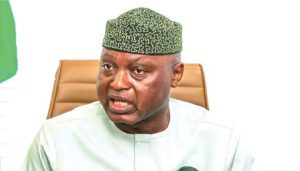COVID-19: Nigeria to receive 16m doses of AstraZeneca vaccine not Pfizer
By Deborah Christopher
The executive director of National Primary Health Care Development Agency (NPHCDA), Dr. Faisal Shuaib has made known that it is a welcome development that Nigeria will be receiving 16million doses of the AstraZeneca vaccine to replace the Pfizer vaccine by the end of February.
According to Shuaib, the 16m doses will invariably help to reach more of the nation’s population and it is best suited for the country’s existing cold chain system.
He made this disclosure at a joint press conference with the WHO country representative Dr Walter Molumbo during the weekend to debunk allegations making the rounds that Nigeria has been disqualified from accessing COVID-19 vaccines.
NPHCDA Executive Director stated that as mentioned by the WHO regional director, a couple of factors influenced the allocation of the small quantity of the 320,000 doses of Pfizer vaccine to covax countries.
He made mention of such factors to include the mortality rates from COVID-19, the number of new cases, the trend in the number of cases, the population of countries and the availability of the appropriate Cold Chain equipment.
“It is clear that countries such as South Africa which received the Pfizer allocation have the new strain of the COVID-19 virus, has the highest mortality rates and is struggling to contain transmission. Furthermore, giving smaller countries such as Cape Verde and Rwanda few doses of the Pfizer vaccine would have a larger public health impact considering their population size.
“100,000 doses to Nigeria, we have all agreed would have been a drop in the ocean. So, it is a welcome development that we are receiving 16m doses of the Astrazeneca vaccine to replace the Pfizer vaccine in the same month of February. The 16m doses will invariably help us reach more of our population and is suited to our existing cold chain system.”
While explaining that the nation was ready for any type of vaccine allocated to it, Faisal assured Nigerians that the Federal Government under the leadership of the President, Muhammadu Buhari is determined and committed to acquiring COVID-19 vaccines that are safe, effective and available for deployment.
In the spirit of transparency and accountability, many of you were with us at the National Strategic Cold store to physically see the ultra cold chain equipment that we have. On the part of the Presidential Task Force on COVID-19 (PTF) and Federal Ministry of Health (FMOH). These Ultra Cold Chain equipment would have been able to store over 400,000 doses of the Pfizer vaccine if these were brought to Nigeria. So we are ready for any type of vaccine that is allocated to us Faisal said, the country representative for world health organisation(WHO) Dr Walter Molumbo in his remark stated that WHO hasn’t disqualified any country in Africa from accessing COVID-19 vaccines through the COVAX facility, but rather is supporting all countries to access vaccines as quickly as possible.
Molumbo stated that “Of the 88 million AstraZeneca doses allocated to African countries for the first phase, Nigeria has received by far the largest allocation, with 16 million doses.”
The WHO country representative also disclosed that the Demand for the initial allocation of 1.2 million Pfizer doses was exceptionally high and COVAX received interest from 72 countries around the world, of which 51 countries were considered by the review committee as “ready” (Nigeria was among these countries) and 18 countries in total were finally chosen to receive initial Pfizer doses.
“On the Africa continent, as of the 18 January deadline, COVAX received 13 submissions and a multi-agency committee evaluated the proposals of which 9 were recommended as ready to deploy the Pfizer vaccine including Nigeria.
“In addition to the Astra Zeneca doses, there is an initial limited volume of Pfizer vaccine available through COVAX.
“Unfortunately, it was not feasible to provide each of these 51 countries with Pfizer doses, due to a number of factors including the limited capacity for Pfizer to handle many countries at once.
“Therefore, spreading the limited doses across all the 51 countries deemed ‘ready’. could have not achieve the intended public health benefit.
“After epidemiological data was taken into account, the decision was taken to proportionally balance the number of self financing and AMC Participants, as well as Participants across all 6 WHO regions.”




